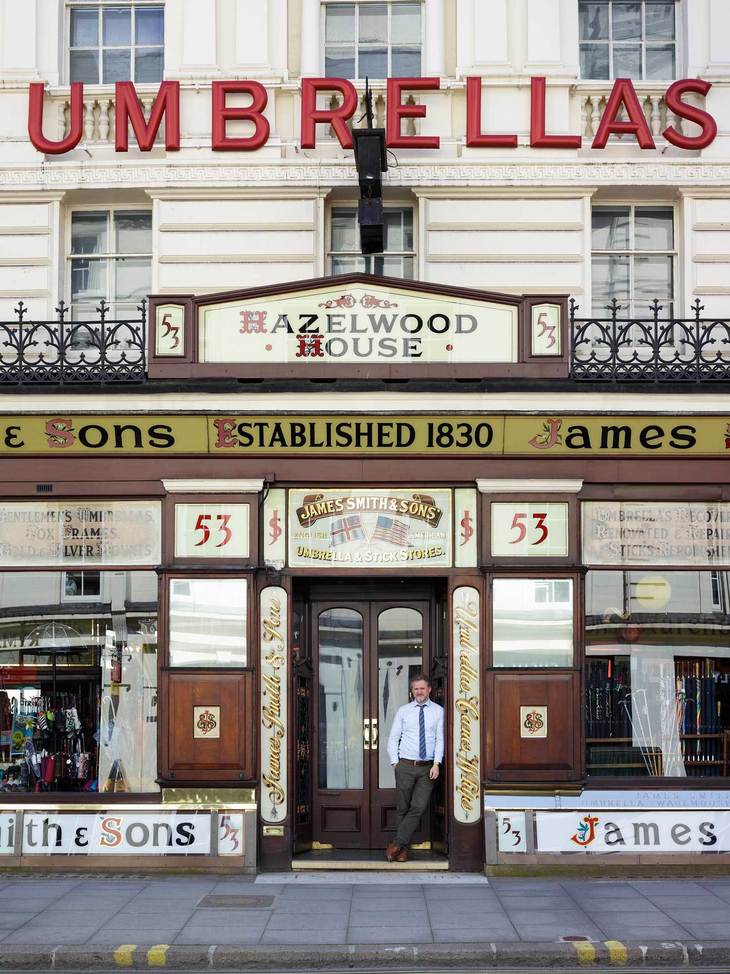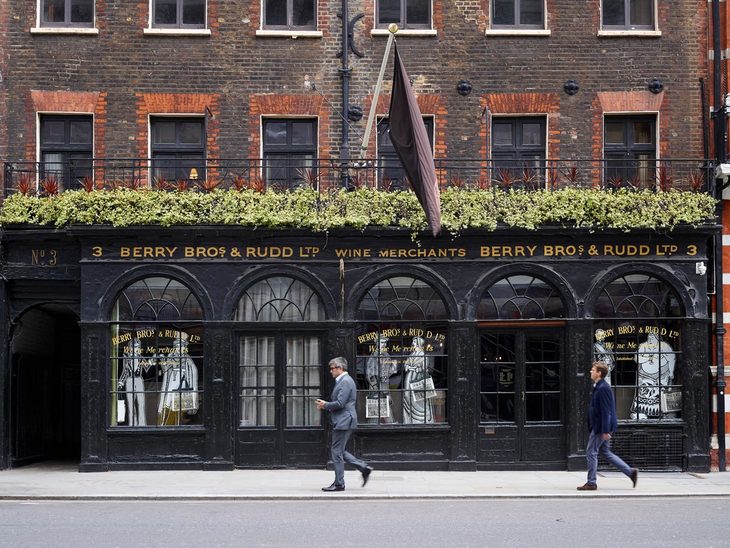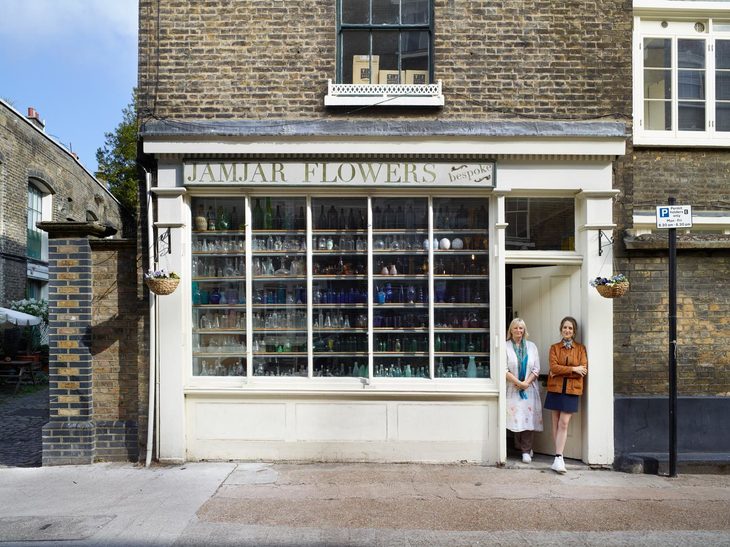Amid the ongoing march of high street homogenisation, London has many charmingly independent and unique shop fronts, ushering us into delights within. Here's a selection from the book, London Shopfronts.
Terry's Cafe, Borough

The façade of this backstreet café, a stone’s throw from Borough market, has maintained the same no-frills air since it was bought by the late Terry Yardley, a master butcher, in 1982. Inside, however, is a different matter. Hundreds of black-and-white photos line the walls, interspersed with bon mots, vintage food posters and a collection of decorative plates. Add red-and-white checked tablecloths, and the result is a combination of British nostalgia and 'roll your sleeves up' grit.
Presiding over the action is Terry’s son Austin (pictured). As much compère as chef, he's grown up among the local community since he took his first Saturday job here at the age of 14. Home cooking is the order of the day, and Austin balks at the idea of the café being labelled a greasy spoon. 'That's not what we’re about,' he says. 'For years, we've provided well-cooked food to set you up for the day. When Dad first opened, our customers were working men – industrial scaffolders, telephone engineers, removal guys. Orders were taken on handwritten tickets, and we pretty much memorised our regulars' favourites.'
The façade of this 1950s building has been reworked to expand into the premises next door, and its fascia has been repainted. Austin's most popular breakfast combos are written in chalk pen on an old antique mirror.
'Over the years, I’ve chased the pound note around a bit trying different ventures, but now I see myself as a shopkeeper first and foremost.'
156–158 Great Suffolk Street, SE1 1PE
James Smith & Sons, Bloomsbury

In a city known for its unpredictable weather, it's hardly surprising that such a prominent building is devoted to the business of umbrellas. Billing itself as 'catering for the likely eventualities of the British weather since 1830', this corner-sited store was the first to sell Samuel Fox's novel steel-ribbed brollies.
James Smith, son of the shop's founder, moved the business to this location in 1857, when a freshly minted New Oxford Street was considered both fashionable and cosmopolitan. The Grade II-listed building, now overseen by store manager Philip Naisbitt (pictured), has barely changed since then, and remains one of the city's most complete original Victorian shopfronts. Remnants of a previous business were unearthed during the
1990s, when a sign for 'Commonwealth Dairies' was discovered under the current façade, while the shop's existing ladies' section is set into what was formerly an oven opening.
The exterior's intricate stucco work, wrought-iron balconies, mahogany-framed windows and enamelled glasswork is in keeping with the 'more is more' decorative approach of the era.
Inside, the rich detail continues, with original late-Victorian wood counters and showcases — a rare survival in the city. Of special note is the balcony office, from where all parts of the shop can be viewed with the aid of tilted mirrors. With made-to-measure walking sticks now available alongside umbrellas, trade remains as brisk as it was nearly two centuries ago. After all, Londoners can always count on the arrival of an ill-timed downpour, whatever the season.
Hazelwood House, 53 New Oxford Street, WC1A 1BL
Berry Bros. & Rudd, St James's

It's a feat to maintain a largely unaltered shopfront through three centuries, but for London's original wine and spirits merchant, little has changed since these two Georgian terraced houses were conjoined. Elegant, arcaded windows are inset into a timber façade, giving way to a wood-panelled listed interior, complete with original shelving and fittings. To the left of the shopfront, a passage has been chiselled out to provide direct access to the rear.
Now known for its vast stock of more than four thousand wines, the shop began life as a grocer's and coffee house, started by a woman known only as 'Widow Bourne'. Original coffee weighing scales still hang from the ceiling, part of a number of dusty artefacts that have accumulated here through the centuries. For years, these scales were also used to weigh fashionable visitors, including Lord Byron.
The shop is still run by Bourne's descendants, who have largely resisted displaying their wares. Wines and spirits are carefully stowed in the basement, giving the store-cum-office, with its tables and counters, the air of an old- fashioned consulting room. These days, a modern, fully stocked shop around the corner satisfies those who prefer to examine the labels.
'Though we’ve contemporised our business, aesthetically, very little has changed,’ says Geordie Willis, eighth generation of the Berry family. 'In fact, recently, we took a paint sample from the original façade, which was beneath decades' worth of layers of paint. The green-black colour you can see today is a replica of the original.’
3 St James’s Street, SW1A 1EG
Hurlingham Books, Fulham

With its windows densely piled with colourful spines, this second-hand bookshop (and unofficial community centre) is something of an icon on its Fulham side street.
This isn't a store that offers a curated, alphabetised selection: the joy of browsing here lies in the prospect of rooting out an unexpected treasure, whether that's a dogeared classic, a well-thumbed popular novel or the occasional first edition. Those that happen to spot what they want amid the precarious piles in the window are asked to stand outside and point at it while an equally wobbly stepladder is fetched. Trestle tables outside groan with £1 paperbacks, and it's not unusual for owner Ray Cole (pictured) to find a few coins on his doorstep in the morning in payment for books picked up overnight by avid readers. There's no inventory or stocktake here — instead, more than two thousand books jostle for space, with a further two million stored in a warehouse nearby.
The 19th-century building is thought to have once been a dairy. Ray took over the premises, then a furniture restorer's workshop, in the 1990s, and neither the shopfront nor the two triangular rooms inside have changed since. One of the delicate leadlight windows still has a hole in it, a decade after it was accidentally broken by a snowball. No matter — it is patched up with books, much like the rest of this delightfully rickety store.
Ranelagh Gardens, 91 Fulham High Street, SW6 3JS
Alice's, Notting Hill

With its pillar-box red frontage, signage that suggests a Victorian travelling circus and a rotating display of stock spilling out on to the pavement, this corner store is hard to miss. On any given day, its exterior might feature hanging pails, upcycled shop signs and framed prints, and you might even spot flocks of plastic pink flamingos jostling for space among the trunks and kitsch chinaware. 'You have to put on a show for people,' says owner Douglas Carter, who insists that he buys whatever strikes a chord, and isn't afraid of tapping into the local tourist trade.
The shop sprang to life courtesy of Douglas's grandfather, rag-and-bone man Minky Warren, who collected bottles, scrap metal, clothes, brass and copper. In the 1950s, he ran a busy barrow trade from the backyard, renting out carts to local vendors and selling on their finds. Eventually, he bought the premises and passed the business on to his sons — who initially painted the frontage orange, before landing on its trademark red.
Renamed 'Alice's' in the 1970s in honour of Douglas's mother, the store exudes playfulness, seen in everything from the pieces it upcycles to its jam-packed window displays. Key to its longevity is a willingness to regularly change things up. 'My dad used to paint scenes directly on to the windows,' says Douglas. 'One week, it might be a man sitting in the bath playing the trombone; the next, a lady cleaning windows.' It’s this sense of irreverence that keeps his exuberant business on the map.
86 Portobello Road, W11 2QD
JamJar Flowers, Walworth

Tucked away in a residential Walworth side street, a window packed full of vintage glassware is the first thing most people notice about this studio, whose aim is 'to tell stories with flowers'. It is part of a collective of workshops housed within a cobbled yard built in the 1870s. Early precursors of the modern live- work concept, the studios are now occupied largely by creatives, including artists, makers and architects.
'Initially, the shop was dark, unloved and grubby, with opaque window coverings,' says floral designer Melissa Richardson (pictured with co-director Amy Fielding). But it was close to New Covent Garden Flower Market, and had wide double doors at the side and an ancient overhead pulley system, useful for drying flowers. 'It also had atmosphere. It felt like a bit of Victorian London, as if time had stood still.'
Though more studio than shop, Melissa felt the Victorian façade called for signage. She commissioned model-maker Fran Lloyd to make a vintage-looking banner for the fascia. Across the inside of the window, simple shelves were fashioned out of scaffolding poles and planks to house an ever-growing collection of ridged poison bottles and mid-century genie vessels. Inside, a reclaimed table, an old draper's unit and a butler's sink are both practical and pleasing.
'We added 'bespoke' to the signage to try to put people off from turning up to buy flowers or glass on the spot, but it didn’t really work,’ Melissa says. 'The shopfront intrigues people and they still knock to have a look round. But secretly, we rather like that.'
7a Peacock Yard, Iliffe Street, SE17 3LH
Saint Aymes, Marble Arch

The bloom-loaded frontage of this café and confectionery store is a colourful talking point in its street of stucco-fronted Georgian townhouses just west of Marble Arch. Severely damaged in the Blitz, the upper storeys were recently rebuilt in reclaimed brick, and this ground-floor shop, formerly a drycleaner's, was reinvigorated by sisters Lois and Michela Wilson (both pictured).
The shop is named after their Barbadian grandparents, Eric and Thyra Aymes, whose abundant Surrey garden provided a colourful counterpoint to the sisters' Hackney upbringing. 'We grew up with a keen sense of how to make things beautiful,' says Lois. 'Our grandmother is a seamstress and loves soft furnishings, while coffee and jazz were permanent fixtures in our home.' As a result, there are plenty of luxurious details within this powder-pink café, from its gold-fronted counter to an interior flower wall. The menu is playfully off-beat too, including a 'unicorn latte' that arrives with a pink, blue or lilac hue, sprinkled with edible gold.
Outside, the floral frontage defies the seasons, being a faux addition. There have been a few iterations since the store opened in 2018, from purple wisteria to the current cherry blossom. 'There's a dreamlike quality to hanging flowers,' says Lois. 'The Caribbean is largely evergreen, so perhaps our floral façade recreates that sense of abundance. We believe that beauty brings out a person's higher purpose, in much the same way that a well-built church is uplifting. Recreating a little of that magic here makes us feel good.'
59 Connaught Street, W2 2BB
Rinkoffs, Bethnal Green

When Hyman Rinkoff started his East End bakery in 1911, he probably didn't think his face would be gracing the façade of this store more than a century later.
Having fled an uncertain political landscape in his native Ukraine, the master baker set up in Old Montague Street, ultimately living above the shop with his seven children. Since then, the business has expanded to incorporate this nearby corner deli with its painted wall mural of Hyman, commissioned by his grandson Ray Rinkoff (pictured with his daughter Jennifer).
Though it was born to serve the local Jewish community with braided challahs, bagels and plavas, the bakery also has a brisk trade in Danishes, cupcakes, Easter and Christmas treats and, more recently, the 'crodough' – a croissant-doughnut hybrid. At one point in the early 2000s, Rinkoffs was producing up to forty thousand muffins a week for Caffè Nero.
When Hyman first set up shop, the area was a Jewish immigrant hub, with dozens of bakeries competing to serve the local community. Since then, many of them have closed, and a thriving Bangladeshi population has settled in the area. 'I employed a great Algerian baker in 1975, and now several of our team happen to be Muslim,' says Ray. 'We work side by side, we respect each other's traditions and we look after each other like family.' Hyman's skills, honed in the port city of Odessa, have passed through five generations of his family, and spread into the wider community too.
79 Vallance Road, E1 5BS
W. Martyn, Muswell Hill

When grocer William Martyn set up shop here in 1897, the premises were newly minted. Built by architect James Edmundson, the store was part of what was originally known as Queen's Parade — a row of tall, practical shopfronts created to serve the burgeoning suburb of Muswell Hill.
As the first to occupy the premises, William made his mark with elegant interiors comprising matchboard panelling, mahogany shelving and numbered storage caddies, which are all still in place today. Outside, the family name was engraved into the fascia, and tall plate glass windows put in to showcase the food-laden shelves within. In the 1920s, the shopfront was panelled with stained glass, but by the 1940s, the façade had been tweaked to accommodate the current wider windows, Vitrolite fascia and mosaic-floored porch.
'Over the years, we evolved to specialise in tea, hand-roasted coffee and fine foods, from dried fruit and nuts to chutneys, preserves, chocolate, cereals, jams and marmalades,' says William, great-grandson of the store's founder, whose aim is to stock unusual but affordable goods. And although its offering has necessarily progressed to avoid the jaws of supermarket chains, aesthetically, little else has altered. 'My father wasn't a great one for change unless it was purposeful,' reflects William. Fortunately, that means a perfectly preserved shopfront, noted for its elegant signage and a welcome that often includes a cup of tea for regulars.
135 Muswell Hill Broadway, N10 3RS
Wenty's Tropical Foods, Forest Gate

With its spearmint-green façade and daily medley of fruit laid out on trestle tables in front, this grocer's brings a hit of colour to the surrounding suburb. Owner Wentworth Newland (pictured), known to all by his nickname, Wenty, settled in the area in the 1960s after leaving Jamaica as a teen. At first, he earned a living selling Jamaican specialties door-to-door from the back of a van, before opening the shop in the mid-1980s.
Soon, locals dropped by regularly for yams, plantain, coconuts, mangos, avocados and, of course, sugar cane, whose many alleged benefits Wenty still shares with all and sundry.
The band of yellow painted across the doorstep means it proudly incorporates all the colours of the Jamaican flag, while its hand-painted typography and simple illustration by a local signwriter form part of a fascia that hasn’t changed since the shop opened.
'When I set up, it was nearly impossible to find tropical foods in the area,' says Wenty. 'I was craving the flavours of home, and so I knew that others who had settled here would be too.'
Now in its fourth decade, the store is a blend of vibrant colour and haphazard detailing. Pineapples hang from wire-fronted windows, sharing space with boxes of mangos. Random business cards are pinned to the doorframe, along with handwritten ads for Uber Eats. Inside, the shelves are lined with Scotch Bonnet pepper sauce, tins of callaloo, juices and condiments in an atmosphere of relaxed yet organised chaos.
26 Upton Lane, E7 9LN

London Shopfronts by Emma J Page and Rachael Smith is published by Hoxton Mini Press, RRP £22.95



